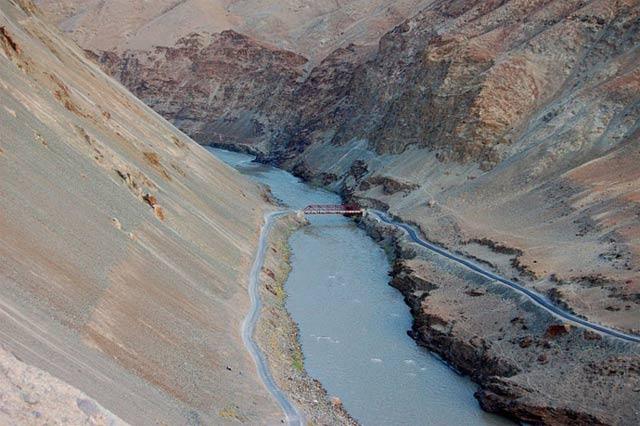Islamabad:
The Arbitration Court constituted in accordance with the 1960 Indian Water Treaty (IWT), ruled on Friday that India’s decision to keep the treaty in suspense did not deprive him of his competence to judge Pakistan’s complaints against his neighbor.
The court issued the “complementary award” in the procedures instituted by Pakistan against India.
“According to this interpretation of the Treaty, the Court has previously found that once a procedure before an arbitration court begins properly, as in the present case,” there must be a strong presumption against the incidental loss of the jurisdiction on the matters that present it for subsequent acts, such as the appointment of a neutral expert.
“Consequently, the text of the treaty, read in the light of its object and purpose, does not allow any of the parties, acting unilaterally, remain in suspense or suspend a continuous process of dispute settlement,” reads the order.
The supplementary prize said that “the text … does not provide the” suspension “or” suspension “unilateral of the treaty. Rather, the treaty provides its continuation in force until India and Pakistan ends mutual consent.”
“This text definitely indicates an intention of the editors not to allow the unilateral action to alter the rights, obligations and procedures established by the treaty, including the procedures for liquidation of treaty disputes.
“In addition, the object and purpose of the treaty, as expressed in its preamble, includes the establishment of procedures for the resolution” of all questions that may arise from now on with respect to the interpretation or application of the provisions agreed in the treaty. “
The order added: “For that purpose, the procedures of the treaty, among other things, ask for the establishment of an arbitration court at the request of one of the parties, and provide that said Arbitration Court, after receiving written and oral presentations, is empowered to present an award or prize that” will be final and binding on the parties with respect to that dispute. “
“It is difficult to see how this object and the purpose of the treaty, the mandatory resolution of disputes for the final resolution of the disputes that arise between the parties, could possibly achieve it if it were open to any of the parties, acting unilaterally, suspend a process according to in accordance with ongoing disputes.
Pakistan was well received by the award, public made on the website of the Permanent Court of Arbitration, saying that he affirmed the Court or the competence of the neutral expert despite the unilateral action of India.
Through an arbitration application on August 19, 2016, Pakistan began arbitration procedures against India, seeking to solve certain problems related to the design or operation of river hydroelectric plants in the Indo, Jhelum and Chenab rivers and their tributaries.
The plants included the Kishenganga hydroelectric plant and the Rat’s hydroelectric plant. After the presentation of the Pakistan arbitration application, India requested the appointment of a neutral expert to solve certain design and operation questions about the two projects.
On October 13, 2022, the World Bank, which had negotiated the IWT 65 years ago, appointed Michel Lino as a neutral expert in accordance with article IX and Annex F to the Treaty. In April 2025, after Pahalgam’s attack, India said he was keeping the IWT in suspense as a punitive measure against Pakistan.
“The Court of Arbitration unanimously considers: a) The position of India that the treaty is maintained in” suspense “, however, that position can be characterized as a matter of international law, does not deprive the Court of Arbitration of Competition,” said the ruling.
“B) considers that the Arbitration Court has the continuous responsibility to advance in its procedures in a timely, efficient and fair manner without taking into account India’s position on” suspense “, and that it would not be inconsistent with its obligations under the treaty,” he added.
“C. determines that the previous findings are applied, mutatis mutandis, with respect to any competition that the neutral expert has otherwise.
The Arbitration Court is led by Professor Sean D Murphy and included Professor Wouter Buytaert, Professor Jeffrey P Menar, Judge Awn Shawkat Al-Khasawneh and Dr. Donald Blackmore. He said that according to IWT, the technical questions could be asked before a neutral expert or an arbitration panel.
Meanwhile, Pakistan welcomed the supplementary prize, pointing out that the court affirmed its competence in the light of recent developments and that the unilateral action of India could not deprive the court or the neutral expert to judge the problems they had before them.
“Pakistan hopes to receive the Court award in the first phase on the merits in due course after the hearing held at the Peace Palace in The Hague in July 2024,” said an official brochure issued after the ruling on the website of the Court was published.
“The high priority, at this point, is that India and Pakistan find a path back to a significant dialogue, even in the application of the swing of the Indo waters,” he said. He referred to the comments of Prime Minister Shehbaz Sharif this week that Pakistan was “ready to participate in a significant dialogue with India.”




